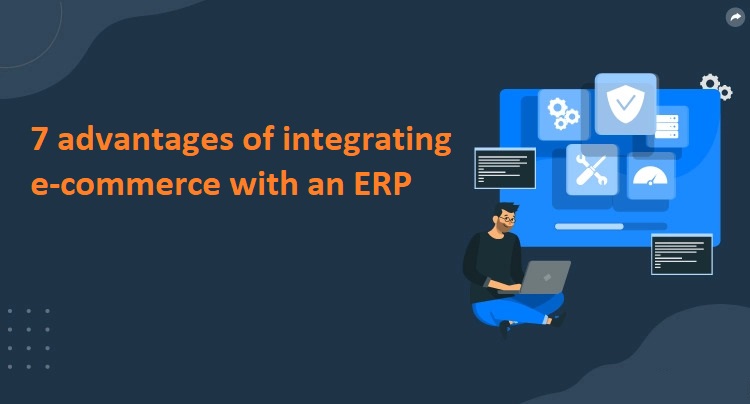Discover all the competitive advantages of integrating your ERP management software with e-commerce.
Many companies when they start selling their products on the internet, do not take into account such important factors as inventory management, process automation, large-scale data processing and order management.
These factors are complex and difficult to manage as sales grow. That is why, in order to control all these transactions from the same platform, the best solution lies in integrating e-commerce with a management system (ERP). The objective is none other than to have all the information available in both systems.
Next, we explain the main advantages of integrating an e-commerce with your management software or ERP.
Advantages of integrating an e-commerce with your ERP
1. Connect to the data source
The main reason for integrating any e-commerce with an ERP arises from the need for the information to be available in both systems.
All the information stored in the ERP about the products, such as the categorization, characteristics, descriptions, updated prices or even available stock, is instantly consulted directly from the e-commerce .
This allows the information from the corporate catalog to be displayed directly in the e-commerce without the need for manual uploads.
2. Reduction of operational costs
Process automation saves large amounts of time and reduces economic costs:
Warehouse operations are streamlined as sales orders are processed automatically .
Such automation prevents improper product uploads and human transcription errors .
By having all the updated information in the ERP about inventories and sales, you can plan purchases with suppliers optimally.
3. Optimal stock management
Inventory is one of the key points of any e-commerce. One of the most common errors is when the online information is not up to date with that of the stores.
This translates into serious problems such as selling products that are not available (out of stock) or showing completely outdated prices. With the synchronization , the inventory is optimized, registering all the movements of the e-commerce in the ERP and vice versa.
This optimization brings with it greater profitability for businesses because many more orders can be fulfilled in less time.
4. Reduce the shipping time of products
After receiving the payment on the web, the data about the order is reflected in the ERP: Product reference, number of items, customer information and all shipping details.
Regardless of the number of orders that are processed, these are generated automatically and can be processed instantly. This procedure is streamlined , considerably reducing shipping times.
5. Improved service and customer experience
Serving customers quickly and efficiently is important . As we have said, by reducing shipping times, your level of satisfaction increases significantly.
In addition, the ERP has an integrated CRM module that records all the information about customers: Number of orders they make, billings, sales predictions or even sales suggestions; being able to offer personalized information and promotions.
Finally, it allows us to provide a better service because all the information about the order is updated periodically. All this information is made available to the customer so that he can know the most recent status of his order.
6. Automatic billing
Another of the great advantages of the integration is that it solves one of the most important financial processes for any company: billing.
When an order is confirmed, the system automatically creates the corresponding delivery notes and invoices , recording all this data in the ERP.
7. Financial reports in real time.
ERP solutions like Dynamics 365 Business Central have data visualization and analysis tools that automatically generate financial reports.
All this information helps organizations make smart decisions, plan their product buying and selling strategies and optimally design their online marketing campaigns.
Ways to integrate e-commerce with an ERP
At Dynamics Square, as experts in ERP and comprehensive development of e-commerce platforms , we have 3 solutions to successfully integrate both systems:
Dynamics 365 Business Central: The most complete ERP from Microsoft.
Dynamics 365 Business Central is an all-in-one business management solution that integrates: Finance, manufacturing, sales, shipping, project management, and customer service; key factors for the correct administration of an e-commerce.
Updated and adapted to new technologies and market needs, it connects all the departments of your company on the same platform through a new concept of high-capacity and personalization management.
It’s cloud-based and seamlessly integrates with other Microsoft technologies like Microsoft 365, Power BI, Power Platform, SharePoint Online, or Dynamics 365.
Start making the most of your business with the most complete ERP management system for companies.
Contact experts in e-commerce integration with ERP
Dynamics Square is a Microsoft Dynamics 365 Gold Partner, we have extensive experience in the integration of e-commerce platforms with the business management software Dynamics 365 Business Central and Dynamics NAV (Navision) in all its versions.
We help you to automate operations and processes, to have total control of your inventory, to synchronize all your information, to invoice automatically and to have a centralized database with all your clients.
For more information on the integration of your ERP with an e-commerce platform, do not hesitate to contact us.



